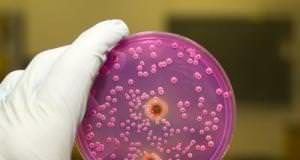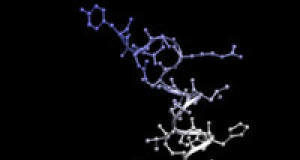Fecal Microbiota Transplants Effective Treatment For C. Difficile, Inflammatory Bowel Disease,...
Growing evidence for the effectiveness of fecal microbiota transplants as a treatment for patients with recurrent bouts of Clostridium difficile (C.difficile) associated diarrhea is presented in three studies -- including a long-term follow-up of colonoscopic fecal microbiota transplant (FMT) for recurrent C. difficile Infection that included 77 patients from five different states -- unveiled at the American College of Gastroenterology's (ACG) 76th Annual Scientific meeting in Washington, DC.
Treatment With Vitamin C Dissolves Toxic Protein Aggregates In Alzheimer’s Disease
Researchers at Lund University have discovered a new function for vitamin C. Treatment with vitamin C can dissolve the toxic protein aggregates that build up in the brain in Alzheimer's disease. The research findings are now being presented in the Journal of Biological Chemistry.
Natural Dye Obtained From Lichens May Combat Alzheimer’s Disease
A red dye derived from lichens that has been used for centuries to color fabrics and food appears to reduce the abundance of small toxic protein aggregates in Alzheimer's disease. The dye, a compound called orcein, and a related substance, called O4, bind preferentially to small amyloid aggregates that are considered to be toxic and cause neuronal dysfunction and memory impairment in Alzheimer's disease.
Recipient’s Immune System Governs Stem Cell Regeneration
A new study in Nature Medicine describes how different types of immune system T-cells alternately discourage and encourage stem cells to regrow bone and tissue, bringing into sharp focus the importance of the transplant recipient's immune system in stem cell-based regeneration.
Evidence Supports Ban On Growth Promotion Use Of Antibiotics In Farming
In a review study, researchers from Tufts University School of Medicine zero in on the controversial, non-therapeutic use of antibiotics in food animals and fish farming as a cause of antibiotic resistance. They report that the preponderance of evidence argues for stricter regulation of the practice. Stuart Levy, an expert in antibiotic resistance, notes that a guiding tenet of public health, the precautionary principle, requires that steps be taken to avoid harm.
Hope For Muscle Wasting Disease
A health supplement used by bodybuilders could be the key to treating a life-threatening muscular dystrophy affecting hundreds of Australian children, new research shows. The amino acid L-tyrosine had a "rapid and dramatic impact" on Nemaline Myopathy (NM) in laboratory tests on mice, significantly improving symptoms of the muscle wasting disease, medical researchers from the University of New South Wales (UNSW) found.
Physical Activity Impacts Overall Quality Of Sleep
People sleep significantly better and feel more alert during the day if they get at least 150 minutes of exercise a week, a new study concludes. A nationally representative sample of more than 2,600 men and women, ages 18-85, found that 150 minutes of moderate to vigorous activity a week, which is the national guideline, provided a 65 percent improvement in sleep quality.
Dreaming Takes The Sting Out Of Painful Memories, Research Shows
They say time heals all wounds, and new research from the University of California, Berkeley, indicates that time spent in dream sleep can help us overcome painful ordeals. UC Berkeley researchers have found that during the dream phase of sleep, also known as REM sleep, our stress chemistry shuts down and the brain processes emotional experiences and takes the edge off difficult memories.
Scientists Turn On Fountain Of Youth In Yeast
Collaborations between Johns Hopkins and National Taiwan University researchers have successfully manipulated the life span of common, single-celled yeast organisms by figuring out how to remove and restore protein functions related to yeast aging.
Diabetes Drug Shows Promise In Reducing Risk of Cancer, Study Suggests
An inexpensive drug that treats Type-2 diabetes has been shown to prevent a number of natural and human-made chemicals from stimulating the growth of breast cancer cells, according to a newly published study by a Michigan State University researcher.
Chew Gum, Lose Weight? Hormone That Helps People Feel ‘Full’ After...
Most people understand that serious weight loss requires changing attitudes toward what they eat and how often they exercise. But, what if the process could be aided by simply chewing a stick of gum after meals? That's the question a team of scientists, led by Syracuse University chemist Robert Doyle, is trying to answer.
Celiac Patients Face Potential Hazard As Information On Cosmetic Ingredients Difficult...
The lack of readily available information about cosmetic ingredients may cause patients with celiac disease who use lip, facial or body products to unknowingly expose themselves to gluten -- an ingredient they need to avoid, according to the results of a new study unveiled at the American College of Gastroenterology's (ACG) 76th Annual Scientific meeting in Washington, DC.















